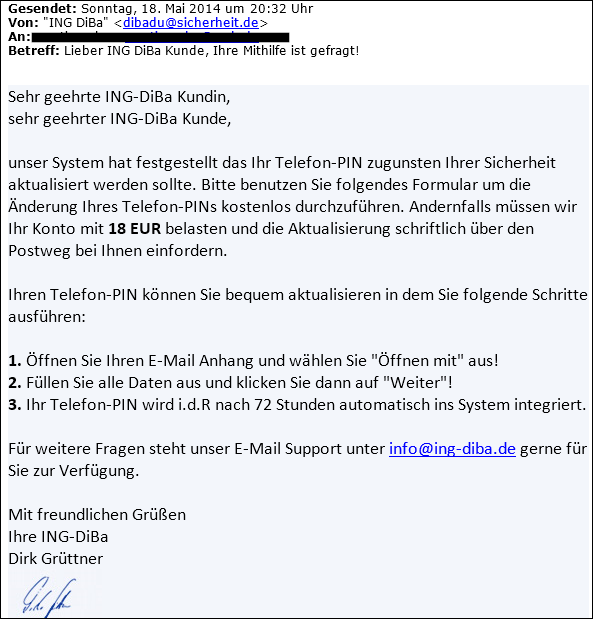Internet fraudsters send thousands of emails in the name of “ING DiBa”. Under the pretext that your account was charged 18 EUR, the phone PIN supposedly needs to be updated. This can be done using a form attached to the email!
ATTENTION: This email did NOT come from ING DiBa Bank, but from internet fraudsters!
This email is about:

The email in full:
Dear ING-DiBa
customer,
our system has determined that your telephone PIN should be updated for your security. Please use the following form to change your telephone PIN free of charge. Otherwise, we will have to debit your account with EUR 18 and request the update from you in writing by post.
You can easily update your phone PIN by following these steps:
1. Open your email attachment and select “Open with”!
2. Fill out all the details and then click “Next”!
3. Your telephone PIN will usually be automatically integrated into the system after 72 hours.
If you have any further questions, please do not hesitate to contact our email support at [email protected] .
Kind regards,
your ING-DiBa
Dirk Grüttner
If you follow the instructions and open the file attachment, the user's web browser opens.
The user finds this form:
In addition to the date of birth , the place of birth , the internet fraudsters also ask for the EC cards and the credit card number of the respective user. You should also enter the previous and new PIN . You should now complete the whole thing with your account number , your password and your DiBa Key !
If you click on “CONTINUE” here, all data would end up in the hands of internet fraudsters!
NOTE: We looked at the source code of this form. Here you will always find references to the “POSTBANK”!
The term “Postbank” can be found several times in the source code. Here you can see that the fraudsters are using the logo (image) of ING DiBa, but the word “Logo: Postbank” was used as the “old” text!
We have rummaged through our archives and reported on a similar case on May 2, 2014: “Phishing attempt: “ Dear Postbank customer, your action is required!”
Since this is the same source code, we assume that both phishing attempts (Postbank and ING DiBa) are sent by the same fraudsters.
Notes:
1) This content reflects the current state of affairs at the time of publication. The reproduction of individual images, screenshots, embeds or video sequences serves to discuss the topic. 2) Individual contributions were created through the use of machine assistance and were carefully checked by the Mimikama editorial team before publication. ( Reason )



